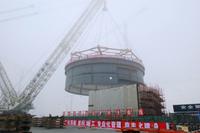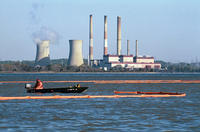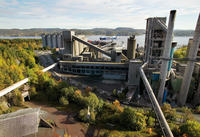-
Fracking in Ohio confirmed as cause of rare “felt” earthquake
In March 2014, a series of five recorded earthquakes, ranging from magnitude 2.1 to 3.0, occurred within one kilometer (0.6 miles) of a group of oil and gas wells operated by Hilcorp Energy, which was conducting active hydraulic fracturing operations at the time. Due to the proximity of a magnitude 3.0 event near a well, the Ohio Department of Natural Resources (ODNR) halted operations at the Hilcorp well on 10 March 2014. A new study links the March 2014 earthquakes in Poland Township, Ohio to hydraulic fracturing that activated a previously unknown fault. The induced seismic sequence included a rare felt earthquake of magnitude 3.0.
-
-
Geochemical reactions may limit effectiveness of carbon storage schemes
New research shows that the natural reactions taking place in some of the underground reservoirs used to store carbon dioxide may prevent carbon emissions from being transported to greater depths, where it may be less likely to leak into the atmosphere. Geochemical reactions taking place in aquifers — underground layers of water-bearing porous rock — may lead to carbon dioxide being “pooled” for hundreds or even thousands of years, and may force a rethink of how these underground reservoirs are used in carbon capture and storage (CCS) schemes.
-
-
United States must seize opportunity to build sustainable energy system: IEA
The United States is in a strong position to deliver a reliable, affordable, and environmentally sustainable energy system, the International Energy Agency (IEA) said, as it released a review of U.S. energy policy. To do so, however, the country must establish a more stable and coordinated strategic approach for the energy sector than has been the case in the past.
-
-
Nuclear power should play “substantial role” in mitigating climate change: Environmental scientists
Leading conservation scientists from around the world have called for a substantial role for nuclear power in future energy-generating scenarios in order to mitigate climate change and protect biodiversity. In an open letter to environmentalists with more than sixty signatories, the scientists ask the environmental community to “weigh up the pros and cons of different energy sources using objective evidence and pragmatic trade-offs, rather than simply relying on idealistic perceptions of what is ‘green’.”
-
-
SCE&G places 180,000-pound CA05 module at V.C. Summer Unit 2, S.C.

South Carolina Electric & Gas Company (SCE&G) and its partners placed on 6 December the CA05 structural module on the V.C. Summer Unit 2 nuclear island. The company says this is one of several milestones achieved this year in the construction of nuclear reactors that are among the first in the U.S. in thirty years.
-
-
New chemical sponge would lessen the carbon footprint of oil industry
U.K. scientists have discovered a ground-breaking technique with the potential dramatically to reduce the amount of energy used in the refinement of crude oil. The existing industrial process uses huge amounts of energy to separate and purify these gases, so the new technique has the potential to revolutionize the oil industry by significantly reducing carbon emissions and making the process more environmentally friendly.
-
-
Storing hydrogen underground could boost transportation, energy security
Large-scale storage of low-pressure, gaseous hydrogen in salt caverns and other underground sites for transportation fuel and grid-scale energy applications offers several advantages over above-ground storage, says a recent Sandia National Laboratories study sponsored by the Department of Energy’s Fuel Cell Technologies Office. Geologic storage of hydrogen gas could make it possible to produce and distribute large quantities of hydrogen fuel for the growing fuel cell electric vehicle market.
-
-
Using earthquake research to refine fracking methods
Researchers at Oklahoma State University (OSU) are using historical earthquake data to make oil and natural gas drilling more efficient. Members of the university research team found that hydraulic fracturing, or fracking, a process in which water and sand are blasted at high pressure into rock to remove oil, can cause an effect similar to earthquakes. Data gleaned from historical earthquake experiences have told scientists much about what happens to the rock during such events – and the knowledge may allow oil companies to understand how to extract gas without also removing groundwater.
-
-
Egypt thwarts terrorist attack on Israeli gas platforms in the Mediterranean Sea

Egypt said it had thwarted an attempt by Islamic State (ISIS)-affiliated Egyptian terrorists on 12 November to attack Israeli energy platforms in the Mediterranean Sea. The terrorists, members of the Ansar Bayt al-Maqdis terror group which operates in the Sinai Peninsula, commandeered an Egyptian navy missile boat for the planned attack. Other Egyptian navy vessels gave chase and stopped the commandeered missile boat, killing eight aboard in a heavy exchange of fire. In addition to attacking Israeli gas platform, the terrorists planned to attack Israeli ships.
-
-
Porous molecules bind greenhouse gases
While carbon dioxide presents the biggest greenhouse problem, several other compounds are hundreds or thousands of times more potent in their greenhouse effect per unit of mass. These compounds include Freons, used as common refrigerants, and fluorocarbons, highly stable organic compounds in which one or more hydrogen atoms have been replaced with fluorine. Chemistry researchers have developed a molecule that assembles spontaneously into a lightweight structure with microscopic pores capable of binding large quantities of several potent greenhouse gases.
-
-
Economists analyze Obama administration's Clean Power Plan
The Obama administration’s Clean Power Plan, released in June 2014 and seeking public comments until 1 December, aims to reduce carbon emissions from existing power plants by 30 percent (below 2005 levels) by 2030. An analysis of the Obama administration’s plan suggests that while the plan improves flexibility, allowing emissions to be reduced in cost-effective ways, additional reforms could permit further emissions reduction for the least cost.
-
-
Gas can be a “bridge fuel” to a low-carbon future

Major new suggests that gas could play an important role as a “bridging fuel” to a low-carbon economy, but warns that it will not be long before gas becomes part of the problem rather than the solution. The research combines the latest energy system modelling techniques with analysis of U.K. gas security to assess future demand.
-
-
Energy engineers call for new, less restrictive regulatory framework for fracking
Leading energy engineers are suggesting that U.K. regulations on the surface vibrations caused by shale gas fracking are unnecessarily restrictive. The engineers state in a new paper that widely applying restrictions similar to those currently in force on fracking would require a ban on heavy vehicles from passing houses or walking on wooden floors. They also state that the threat of serious earthquakes caused by fracking activity is considerably lower than commonly feared.
-
-
New technology reduces cost to capture carbon

The U.S. Department of Energy’s Savannah River National Laboratory (SRNL) has signed an Exclusive Rights Agreement with Partnering in Innovation, Inc. of Orlando, Florida, in support of new carbon capture technology. Originally developed at SRNL, this approach will help open global markets for cost-effective industrial carbon dioxide (CO2) capture and re-use.
-
-
Generating fuel from sunlight
Researchers have made significant progress towards developing a process of Artificial Photosynthesis (AP) that could replace the use of fossil fuels in the future. AP is the industrial process of preparing fuels and chemicals from nothing more than carbon dioxide, water and sunlight. It is a vital process that would be the foundation of a world that would no longer need fossil fuels.
-
More headlines
The long view
Virtual Models Paving the Way for Advanced Nuclear Reactors
Computer models predict how reactors will behave, helping operators make decisions in real time. The digital twin technology using graph-neural networks may boost nuclear reactor efficiency and reliability.
